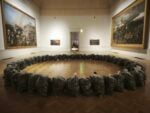Maurizio Vicerè – Nightwatchers
.jpg)
Mostra personale
Comunicato stampa
"È ancora necessario affermare che gli ingegneri della repressione non sono né la tecnologia, né la tecnica, né la macchina, ma la presenza, in loro, dei padroni che determinano il loro numero, il loro breve intervallo di vita, il loro potere, il loro posto nella vita, e il desiderio per loro? È ancora necessario ripetere che la scienza e la tecnologia sono i grandi veicoli della liberazione, e che è solo il loro uso e restrizione nella società repressiva che li rende veicoli di dominazione?" (1)
Nell’impero dell’immagine la volontarietà tocca l’esibizionismo: solo ciò che è guardato è accettato, condiviso, legittimato. L’atto del guardare e dell’essere visti diventano metafore concrete dell’identità. Ma è un essere visti non come soggetto da altri soggetti, bensì come materiale amorfo che cerca la sua forma esibendosi a un pubblico che anziché rapportarsi dialogicamente, ne registra solo l’esibizione. Lo sguardo dell’altro diviene salvifico: è uno sguardo oggettivizzante, che non aiuta a rivelare e rivelarsi ma induce dipendenza e conformismo.
Il dispositivo a rete – ciò che Foucault definisce come meccanismo Panoptico – non riguarda più solo l’architettura degli edifici – ormai totalmente domotizzata - o la struttura degli apparati di potere – intimamente robotizzata - ma lo spazio sociale in quanto tale.
La tecnologia di cui ci alimentiamo è immateriale tanto da produrre un “sguardo olistico”, una gabbia invisibile e intangibile. O tante gabbie, altrettanti piccoli teatri, in cui ogni attore è solo, perfettamente individualizzato e costantemente visibile a uno specchio molteplice le cui mille facce riflettono la stessa immagine.
… les miroirs sont les portes à travers lesquelles la Morte va et vient. (2)
Se il modello panottico disegnato da Bentham stabiliva una netta separazione tra chi guarda e chi è guardato, e dunque una gerarchia tra chi esercita il potere e chi lo subisce. Una separazione e una gerarchia totalmente superate con l’avvento di internet, poiché ogni soggetto accetta di essere guardato in cambio del privilegio di guardare tutti gli altri: Synopticon. La sorveglianza costante – così come tutte quelle modalità di controllo che si fondano sulla metafora spaziale dello sguardo come strumento di potere dell’osservatore rispetto al soggetto passivamente osservato - è un meccanismo di potere sull’uomo non molto distante da quello che si instaura tra servo e padrone, prossimo all’idea servitù volontaria. Ognuno di noi è controllore dell’altro e al tempo stesso controllato dall’altro. Viviamo in un mondo dove la sorveglianza non prevede un centro unico di controllo, ma è distribuita e capillare. Un mondo quasi perfetto per costruire uomini malleabili e soprattutto auto-addomesticati, auto-docilizzati.
We are in the darkness; nameless things with no memory – no knowledge of what went before, no understanding of what is now, no knowledge of what will be. (3)
Ci troviamo in una cella ricoperta di schermi, che riproducono ciò che accade in tutte le altre celle; e questo ovviamente in ogni cella, in ogni luogo e in un tempo perennemente presente. Siamo circondati da sfere specchianti che, come magneti, attraggono e respingono, trasmettono e ricevono perennemente. Riflessi capaci di seguire ogni spostamento nello spazio, di riprodurre la tangibilità dei corpi in immagini di videosorveglianza o dati di tracciabilità. Uno “sguardo Altro” che non giudica ma che semplicemente dissocia la coppia cognitiva del vedere-essere visti.
La sorveglianza ha rimpiazzato lo spettacolo e lo spettacolo è diventato sorvegliato.
Attraverso le protesi digitali, il controllo diventa spettacolarizzazione della realtà in cui ogni confine tra Sé e la sua replica sfuma: ri-viviamo come riflesso in un algoritmo, nel cloud, nei device che usiamo e nei dati che produciamo. L’osservazione reciproca diventa una tacita pratica di routine favorita dallo stesso meccanismo di news feed. Questa forma di ritualismo genera una nuova modalità di controllo sociale, un guardare e farsi guardare che è alla radice della logica stessa su cui si fonda la socialità sul web. Chiunque sia sottoposto a un campo di visibilità, prende a proprio conto le costrizioni del potere; le fa giocare spontaneamente su se stesso; inscrive in se stesso il rapporto di potere nel quale gioca simultaneamente due ruoli, diviene il principio del proprio assoggettamento.
La sorveglianza è qui per rimanere, “la sua vocazione è divenire funzione generalizzata.” (4)
Giuseppe Pinto.
Curatore e fondatore del progetto Like A Little Disaster (Polignano A Mare, Italy)
(1) Herbert Marcuse, Saggio sulla liberazione.
(2) Jean Cocteau, Orfeo (Orphée)1950.
(3) "Five Characters in Search of an Exit" episodio n.79 della serie televisiva "Ai confini della realtà" (The Twilight Zone) 1959. https://www.youtube.com/watch?v=Mp_dZqBFxVU&t=78s
(4) Michel Foucault, “Sorvegliare e punire. La nascita della prigione”, 1975.
BIO:
Maurizio Vicerè (Vice). Pescara 1985.
Degree in Communication Art and Multimedia
Co-founder of ULTRASTUDIO
www.ultrastudio.sexy
Founder and curator of THE COURT
www.thecourtspeaks.com
https://aka-vice.tumblr.com
YOUR LIFE. EXPOSED.
"It is still necessary to affirm that the engineers of repression are neither the technology, nor the technique, nor the machine, but the presence, in them, of the masters who determine their number, their short interval of life, their power, their place in life, and the desire for them? Is it still necessary to repeat that science and technology are the great vehicles of liberation, and that it is only their use and restriction in the repressive society that makes them vehicles of domination? " (1)
In the Empire of Image, voluntarism touches exhibitionism: only what is looked at is accepted, shared, is legitimized. The act of looking and being seen becomes concrete metaphors of identity. But it is a being seen not as a subject by other subjects, but as an amorphous material that seeks its form by exhibiting itself to an audience that, instead of dialoguing, registers only its exhibition. The gaze of the other becomes salvific: it is an objectifying gaze that does not help to reveal and reveal itself but induces dependence and conformism.
The network device - what Foucault defines as the Panoptic mechanism - is no longer just about the architecture of buildings - now totally domotized - or the structure of the power apparatuses - intimately robotized - but the social space as such.
The technology we feed on is immaterial enough to produce an "holistic look", an invisible and intangible cage. Or many cages, as many small theatres, in which each actor is alone, perfectly individualized and constantly visible to a multiple mirror whose thousand faces reflect the same image.
… Les miroirs sont les portes à travers lesquelles the Death va et vient. (2)
If the panoptic model designed by Bentham established a clear separation between the viewer and the observed, and therefore a hierarchy between those who exercise power and those who suffer it. A separation and a hierarchy totally overcome with the advent of the internet, since each subject agrees to be looked at in exchange for the privilege of looking at all the others: Synopticon. Constant surveillance - as well as all those modes of control that are based on the spatial metaphor of the gaze as an instrument of the observer's power with respect to the passively observed subject - is a mechanism of power over man not very far from what is established between servant and master, close to the idea of voluntary servitude. Each of us is the controller of the other and at the same time controlled by the other. We live in a world where surveillance does not include a single control center, but is distributed and widespread. An almost perfect world to build malleable and above all self-domesticated, self-documented men.
We are in the darkness; nameless things with no memory - no knowledge of what went before, no knowledge of what is now, no knowledge of what will be. (3)
We are in a cell covered with screens, which reproduce what happens in all the other cells; and this obviously in every cell, in every place and in a perennially present time. We are surrounded by mirroring spheres that, like magnets, attract and repel, transmit and receive perennially. Reflections capable of following every movement in space, of reproducing the tangibility of bodies in video surveillance images or traceability data. An "Other look" that does not judge but that simply dissociates the cognitive couple of seeing-being seen.
Surveillance replaced the show and the show became guarded.
Through digital prostheses, control becomes a spectacle of reality in which every boundary between Self and its replication fades: we re-live as a reflection in an algorithm, in the cloud, in the devices we use and in the data we produce. Mutual observation becomes a tacit routine practice favored by the same news feed mechanism. This form of ritualism generates a new mode of social control, a look and make oneself look that is at the root of the very logic on which sociality is based on the web. Whoever is subjected to a field of visibility, takes the constraints of power into his own account; makes them play spontaneously on themselves; it inscribes in itself the power relationship in which it plays two roles simultaneously, it becomes the principle of its own subjection.
Surveillance is here to stay, "its vocation is to become a generalized function". (4)
Giuseppe Pinto.
Curator and co-founder of Like A Little Disaster project (Polignano A Mare, Italy)
(1) Herbert Marcuse, Saggio sulla liberazione.
(2) Jean Cocteau, Orfeo (Orphée)1950.
(3) "Five Characters in Search of an Exit" episodio n.79 della serie televisiva "Ai confini della realtà" (The Twilight Zone) 1959. https://www.youtube.com/watch?v=Mp_dZqBFxVU&t=78s
(4) Michel Foucault, “Sorvegliare e punire. La nascita della prigione”, 1975.
BIO:
Maurizio Vicerè (Vice). Pescara 1985.
Degree in Communication Art and Multimedia
Co-founder of ULTRASTUDIO
www.ultrastudio.sexy
Founder and curator of THE COURT
www.thecourtspeaks.com
https://aka-vice.tumblr.com



